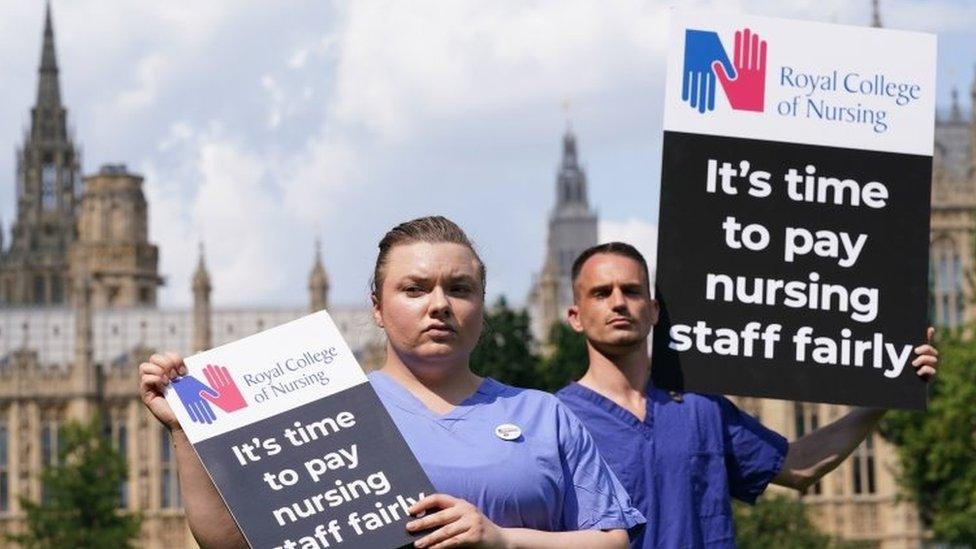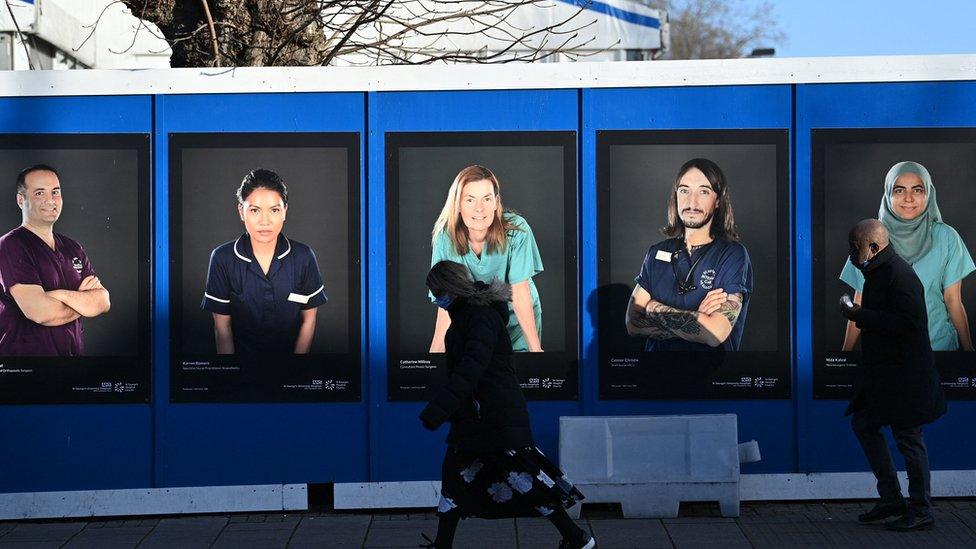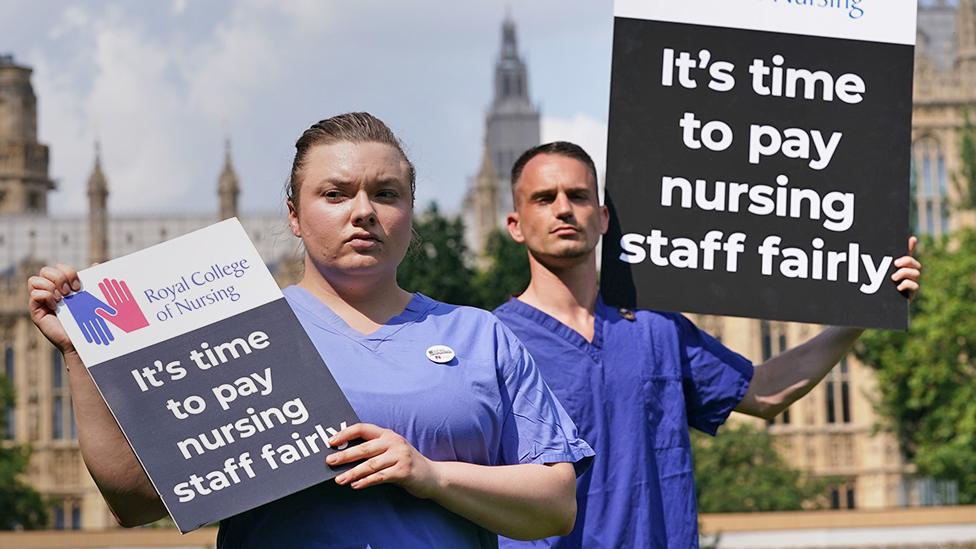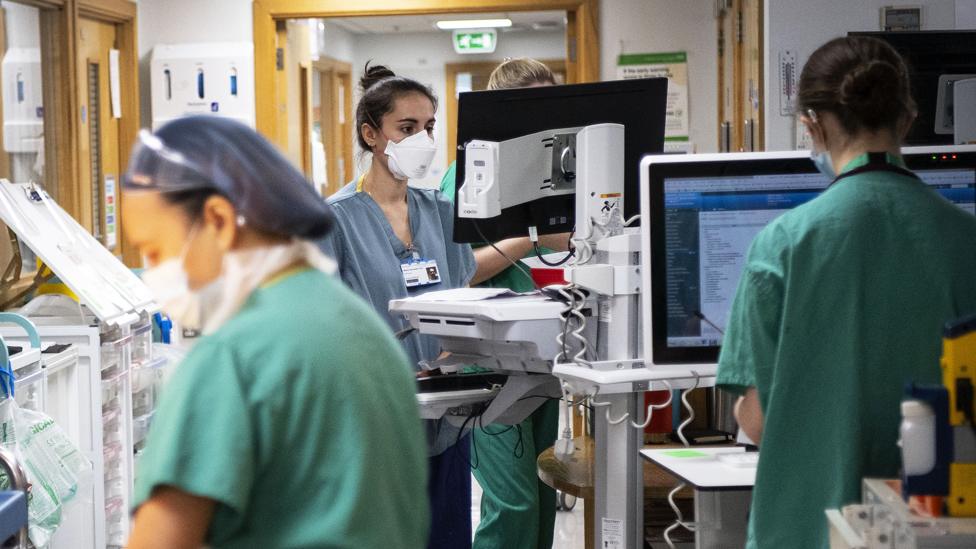NHS: Londonderry nurse's 'life-changing' move to private sector
- Published

Karla Mullan left the Western Trust in 2020 for the private sector
A Londonderry nurse has described how leaving the NHS for the private sector in 2020 has been "life-changing".
Karla Mullan is one of 788 nurses who have left the Western Trust since April 2020, BBC Radio Foyle has learned.
The 40-year-old said that although she loved her profession, it had become unconducive to family life.
She was speaking as nurses in NI, England and Wales prepare to strike over pay in what is set to be their biggest walkout in the NHS's history.
Ms Mullan began working in Altnagelvin Hospital in 2006 and stressed that she "adored" her job in the early years.
"I remember the first day, I ran over to laundry to get my blue uniform, I was just so proud to be a nurse," she said.
But in more recent times, the mother-of-three found nursing to be an increasingly pressurised profession that was not conducive to family life and she often found it difficult to unwind on days off.
"In the trust, even on my days off, I'd be taking calls. Nurses take the brunt of everything. They work hard, long hours and their patient care comes first, sometimes they take that home with them to their families. They can't just switch off."

Nurses are preparing for the biggest strike in NHS history next week
In August 2020, Ms Mullan was approached by a private healthcare manager who offered her more flexible work which was also better paid.
"He was able to accommodate my family life. He offered me shifts that worked around my children and their needs," she added.
In a statement, the Western Trust said 203 permanent and temporary nurses have left over the past eight months "for a variety of reasons including resignation, retirement, end of fixed-term contract, ill health or termination".
Between April 2021 and April this year, 323 nurses left the trust.
'It's just less stressful'
As well as her care-home work, Ms Mullan now also has the time to run a part-time aesthetics business and her childcare costs have reduced significantly as her children only need to attend a childminder once a week.
"It just gives me so much more flexibility and made family life easier, not juggling shifts and childcare. It's just less stressful," she said.
"And now I don't have the guilt, it's been life-changing. As nurses we put our profession before our children at times. It's not flexible for mothers and fathers.
"The pressure comes from trying to balance your work life and family life. I have that now."
She is really enjoying working in a care home too.
"The elderly are so lovely to care for, they have lovely stories. I feel like I've adopted 24 grannies and granddas," she added.

Nurses in Northern Ireland are preparing to take strike action in December
A 2022 report by the Nuffield Trust, external concluded that although retirement was the most common reason for departures, work-life balance is now the second most common reason for leaving a role.
It suggested the numbers citing this reason are now nearly four times higher than a decade ago. It also stated numbers leaving due to health reasons have also nearly quadrupled.
"Nursing is the single largest profession in the NHS, but it suffers from substantial staffing shortages," the report stated.
Last month, the BBC found NHS bosses are increasingly paying premium rates for agency staff to plug holes in rotas.
'Agencies paying nearly double'
Ms Mullan can see the appeal of agency work, particularly among young nurses who may have fewer family commitments.
"You'd see people leave, but then they'd be back in a different uniform, earning more money as agency," she said.
"It's not good for morale. They really should look after the staff that are there - pay them the double time if they want to do extra hours.
"There are lots of agencies out there and they seem to be looking after their staff very well.
"I can see why they would go and then they have the opportunity of going to a different trust or they can go into private healthcare. There are so many different doors."
Related topics
- Published25 November 2022

- Published11 November 2022
